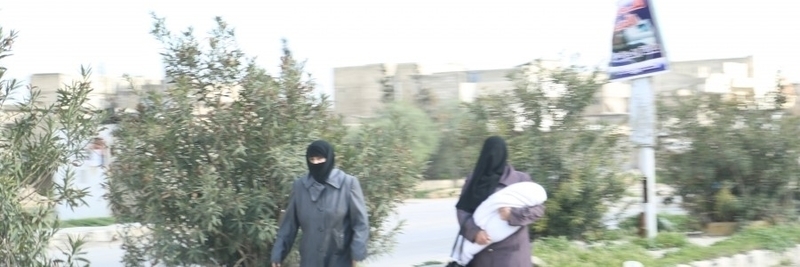One of the hardest things that can happen to a person is to lose a loved one, especially when that loved one is their own child.
I speak out of experience. It happened to me. I lost my son Abdel Rahman when he was only 29 years old.
Abdel Rahman was involved in the Syrian revolution from the start. He used to sneak out of our house at night to paint revolutionary graffiti slogans on walls. I spent those nights living in fear, waiting for him to come home.
When the demonstrations erupted, we both took part in them, walking hand in hand and calling out for our freedom. I also supported my son by making banners and flags for him and his friends to carry. It was a period of unforgettable enthusiasm.
It lasted until March 2013 when government forces entered Idleb, raiding houses and arresting members of the opposition.
When the soldiers came to my neighborhood, I hid Abdel Rahman in our water tank. They searched every nook and cranny of our house, but they didn’t find him, thank God.
I decided right there and then to flee.
We split up. Abdel Rahman took cover in the forests, while I accompanied his wife and children to an agreed meeting point via a different route.
Our meeting point was a village called Seyjar. We settled down there, living in a house that soon began to resemble a military barracks for the Free Syrian Army (FSA). Fighters would bring their wives to stay at our house while they were in the field, and I would cook and buy clothes for them. Some of them were foreigners, and we would communicate by signalling to each other, or using the handful of English words we knew.
I was very proud that our poor language skills did not form a barrier between us. I think we bonded over our faith in God, and I had great respect for those foreign women who had proven their faith by wearing the Muslim hijab.
Abdel Rahman’s belief in the jihad increased with every battle he fought. Although he was always cheerful and laughing, he dreamed of another life.
“My aim is to live in paradise,” he would say.
“How can you love life on earth yet yearn for the afterlife?” I asked.
“Each day my love for my wife and children grows stronger, so I try to enjoy my time with them and make them happy,” he replied. “As for my jihad, it earns me God’s love and an afterlife in paradise.”
His wife would cry when he said things like this. She tried her best to talk him out of jihad, “You have fought many battles and done enough,” she would say. “Why do you want to die?”
Abdel Rahman would always recite a verse from the Koran as his answer: “And never think of those who have been killed in the cause of Allah as dead. Rather, they are alive with their Lord, receiving provision.”
A day before he was martyred, my son bought a bulletproof vest. When I asked him about it he said, “I didn’t buy it out of fear of death, I’m just following in the footsteps of the Prophet Muhammad, who owned a shield.”
The following day, while we were having our morning coffee, he received a call on his walkie-talkie. He rushed out without asking me whether I needed him to bring anything back. He had never done that before. Perhaps he forgot because he was in a hurry, or perhaps he sensed he would not be coming back.
At sunset, my son was brought home on a stretcher. His battalion had been targeted by a heat-seeking missile. The explosion had left his whole body burnt, but his face had been spared.
My heart sank and I was unable to hold back my tears. I fell to the ground and knelt in prayer to God, “I offer my son to You. May You accept him”.
I kissed his forehead, not noticing the odor of his burnt flesh. His face seemed to be shining with the light of his faith.
My friends and family gathered around me to offer their condolences. Somehow I managed to compose myself and say, “There will be no mourning. We should all rejoice. This is the path he chose, and he was granted his wish.”
Life goes on, and eventually Abdel Rahman’s wife remarried. I have now taken on the responsibility of raising his children, and I am preparing them for jihad with the FSA. Like their father before them, they will grow up enjoying life while aiming for an afterlife in paradise.
This article was republished at The Syrian Observer at a private approval of Damascus Bureau


